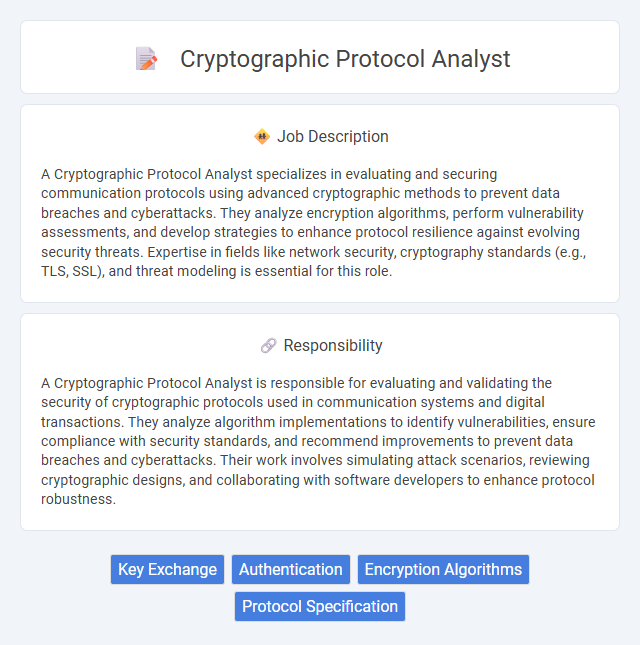
A Cryptographic Protocol Analyst specializes in evaluating and securing communication protocols using advanced cryptographic methods to prevent data breaches and cyberattacks. They analyze encryption algorithms, perform vulnerability assessments, and develop strategies to enhance protocol resilience against evolving security threats. Expertise in fields like network security, cryptography standards (e.g., TLS, SSL), and threat modeling is essential for this role.
Individuals with strong analytical skills, a solid understanding of mathematics, and a keen interest in cybersecurity will likely be well-suited for a cryptographic protocol analyst role. Those who enjoy problem-solving, attention to detail, and working with complex algorithms might find this career rewarding and engaging. People lacking in technical aptitude or those who prefer less structured and more interpersonal work environments may not find this job suitable.
Qualification
A Cryptographic Protocol Analyst must possess a strong foundation in cryptography, computer science, and information security principles, often requiring a bachelor's or master's degree in cybersecurity, computer science, or a related field. Proficiency in analyzing cryptographic algorithms, understanding protocol vulnerabilities, and experience with tools like Wireshark, OpenSSL, or cryptographic libraries are essential qualifications. Familiarity with standards such as TLS, SSL, and knowledge of programming languages like Python, C++, or Java significantly enhance effectiveness in this role.
Responsibility
A Cryptographic Protocol Analyst is responsible for evaluating and validating the security of cryptographic protocols used in communication systems and digital transactions. They analyze algorithm implementations to identify vulnerabilities, ensure compliance with security standards, and recommend improvements to prevent data breaches and cyberattacks. Their work involves simulating attack scenarios, reviewing cryptographic designs, and collaborating with software developers to enhance protocol robustness.
Benefit
Cryptographic protocol analysts likely enhance security frameworks by identifying vulnerabilities in encryption systems and suggesting improvements, which can reduce the risk of data breaches. They probably contribute to maintaining compliance with industry standards, potentially safeguarding organizations from legal and financial penalties. This role might also offer opportunities for professional growth in the rapidly evolving field of cybersecurity.
Challenge
A cryptographic protocol analyst likely faces complex challenges in identifying vulnerabilities within secure communication systems, requiring deep expertise in cryptography and protocol design. The role probably demands rigorous testing and verification under diverse threat models to ensure robustness against emerging cyberattacks. Constantly evolving technologies and sophisticated adversaries might necessitate continuous learning and adaptive problem-solving skills.
Career Advancement
A Cryptographic Protocol Analyst specializes in evaluating and enhancing the security of encryption methods to protect sensitive data against cyber threats. Mastery of advanced cryptographic algorithms and continuous skill upgrades in quantum-resistant protocols accelerate career progression toward senior security architect or cryptography consultant roles. Expertise in blockchain, secure multiparty computation, and compliance with international security standards significantly increases job market demand and salary potential.
Key Terms
Key Exchange
A Cryptographic Protocol Analyst specializes in evaluating and designing secure key exchange methods to ensure confidentiality and integrity in data transmission. Proficiency in protocols like Diffie-Hellman, Elliptic Curve Diffie-Hellman (ECDH), and TLS key handshake processes is essential for mitigating risks such as man-in-the-middle attacks and replay attacks. The analyst employs cryptanalysis techniques and formal verification tools to validate protocol robustness and compliance with industry standards like NIST and ISO/IEC.
Authentication
Cryptographic protocol analysts specialize in evaluating and enhancing authentication mechanisms within digital communication systems to ensure secure user identity verification and data integrity. They conduct thorough assessments of cryptographic algorithms, protocols, and key exchange methods used in multi-factor authentication, biometrics, and token-based systems. Their expertise is critical for detecting vulnerabilities, preventing unauthorized access, and maintaining robust security frameworks in industries such as finance, government, and cybersecurity.
Encryption Algorithms
Cryptographic protocol analysts specialize in evaluating and improving encryption algorithms to ensure robust data security and prevent unauthorized access. They conduct rigorous assessments of cryptographic protocols such as AES, RSA, and ECC to identify vulnerabilities and optimize algorithm performance. Expertise in mathematical foundations, cryptographic standards, and real-world attack vectors is essential for developing resilient encryption solutions.
Protocol Specification
Cryptographic protocol analysts specialize in evaluating and verifying protocol specifications to ensure secure communication and data exchange. They analyze protocol algorithms, identify potential vulnerabilities, and validate compliance with industry standards such as TLS, SSL, and IPsec. Expertise in formal methods, cryptographic primitives, and protocol design is essential for ensuring robust security in software and network systems.
 kuljobs.com
kuljobs.com